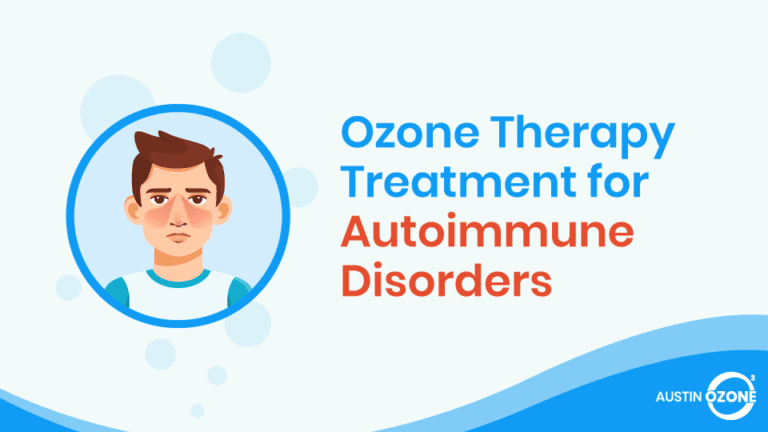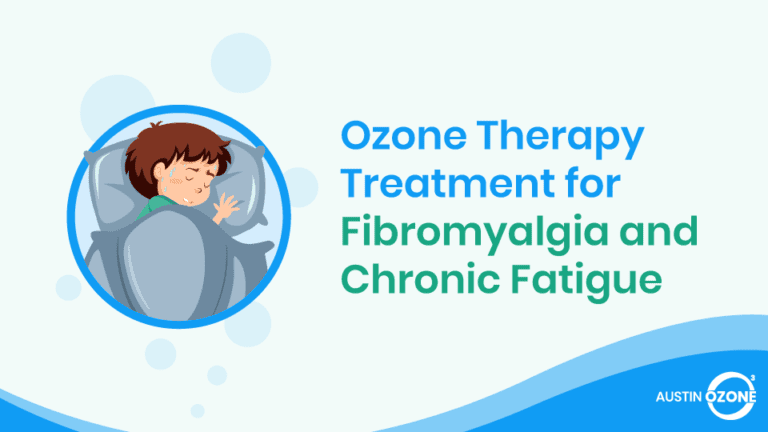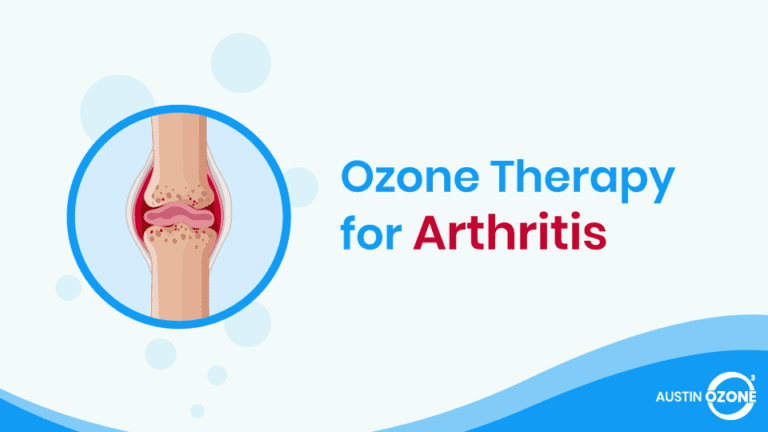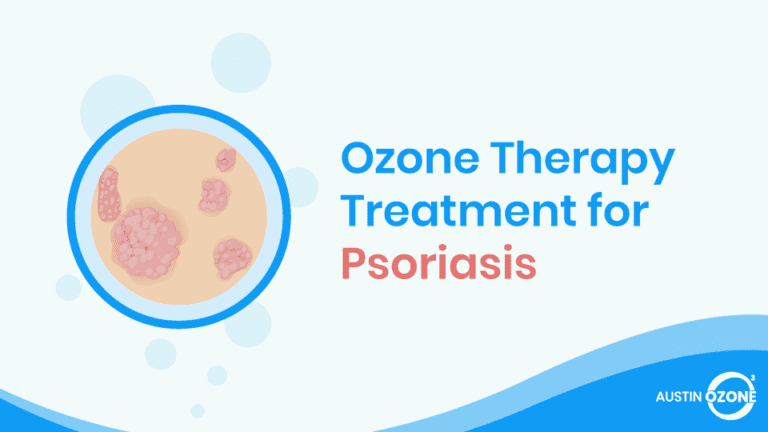Our immune system is biologically set to guard us against foreign cells and germs such as viruses and bacteria. The moment it detects foreign particles, the immune system delivers out a group of fighter cells conditioned to attack and protect the body. Under normal conditions, the immune system can readily tell the difference between foreign cells and our own cells.
However, autoimmune disorders such as lupus, type 1 diabetes, multiple sclerosis, and others disrupt our immune system’s ability to distinguish the foreign cells it needs to eliminate from the cells it needs to protect.
Ozone therapy is one of the most powerful treatments for healing and detoxifying the body, as well as in boosting one’s immunity5. It can be helpful in treating many chronic ailments, which include autoimmune disorders. The ozone therapy for autoimmune diorder boosts the body’s natural functions by supplying ozone into the body, resulting in better oxygen utilization, thus allowing the body to begin to heal.
Schedule an Ozone Therapy Session Today!
What Is an Autoimmune Disorder?
What causes the immune system to malfunction and attack the healthy tissues is different from person to person, although there are similarities.
An autoimmune disease4 occurs when your body mistakenly attacks your normal cells. Your natural defense system becomes confused in distinguishing your body’s own cells from those that are foreign.
The type of tissue being attacked determines the kind of autoimmune disease that will develop9. There are different kinds of autoimmune disorders and some do not have specific names.
An autoimmune disease occurs when your body mistakenly attacks your normal cells. Your natural defense system becomes confused in distinguishing your body’s own cells from those that are foreign.
With this kind of disease, the body, say your skin or your joints, become the target of the immune system, as it now treats it as foreign9. It produces autoantibodies, the proteins tasked to destroy the healthy cells.
There are over 80 different types of autoimmune diseases that may affect different parts of the body. Some types target only one organ. An example is Type-1 Diabetes, which specifically targets the pancreas9. Other types of the illness, such as the Systematic Lupus Erythematosus or SLE, can affect multiple organs of the body.
Some of the most common autoimmune diseases9 are rheumatoid arthritis, a form of arthritis that mainly hits the joints; psoriasis, a skin condition characterized by thick, scaly patches on the skin; lupus, a chronic disease that generally affects the different parts of the body, such as the skin, joints, and other organs; and thyroid diseases , characterized by either the overproduction (hyperthyroidism) or underproduction (hypothyroidism) of the thyroid hormone.
Autoimmune Disorders: Causes and Symptoms
Causes
Until now, researchers still cannot identify the exact reasons and processes that cause the misfiring of our immune system. However, a study by Morteza Izadi and colleagues3 shows that some people are more likely to have an autoimmune disease than others.
In terms of gender, they claim that women have a higher chance of getting autoimmune diseases3, with a ratio of 2:1. This translates to 6.4 percent for women and 2.7 percent for men. The study also reveals that the disease often occurs during women’s childbearing years, that is, from 15 to 44 years old.
Ethnicity9 is also a factor as some groups such as the Hispanic and African American people are more likely to have lupus compared to Caucasians.
Lupus and multiple sclerosis (MS) can also be passed on from generation to generation in a specific family. Although not everyone in the family will automatically get the same kind of autoimmune disease, they will surely acquire at least a vulnerability to autoimmune diseases.
Researchers also consider other factors such as environmental conditions, exposure to chemicals, diet, hygiene, infections, obesity, and others as possible causes of autoimmunity.
Symptoms
In regard to symptoms, some are more severe than others. The symptoms a specific person will get is relative to many of the different factors mentioned above (e.g., environment, genetics, personal health, etc.).
The common symptoms9 that exhibit in the different types of diseases are the following: fatigue, joint pain and swelling, skin problems, digestive issues, fever, swollen glands, and others.
One thing to remember is that there is no single test that can diagnose an autoimmune disease. One must have a particular symptom fused with a specific blood marker and/ or tissue biopsy to be diagnosed with it.
The long-term effects of autoimmune disorders like lupus, rheumatoid arthritis, or psoriatic arthritis increase the risk of serious complications such as heart disease9. In this regard, it is important to manage your blood pressure and cholesterol levels within healthy ranges and to maintain a healthy and nutritious diet and regular exercise.
Ozone Therapy
Ozone therapy has a long history of serving as an effective medical alternative for people who suffer from chronic diseases such as autoimmune disorders. The infusion of ozone (O3)5 into the body efficiently oxidizes the body, allowing it to function properly.
The therapy improves the patient’s health by providing quick relief from symptoms or from the effects of hormonal imbalances, as experienced by people who suffer from thyroid disorders3. The ozone gas further helps stimulate cellular regeneration and repair, thereby improving blood circulation and oxygen supply for people who suffer from autoimmune disorders3.
Ozone therapy improves the patient’s health by providing quick relief from symptoms or from the effects of hormonal imbalances, as experienced by people who suffer from thyroid disorders.
The ozone gas’ infusion into the body pushes for the interaction between the lipids and amino acids, allowing for the efficient delivery of oxygen to our cells and tissues and increasing the body’s energy levels5. The treatment can rapidly improve the immune system’s function, as it helps detoxify the body.
Ozone therapy also delivers a determined amount of oxidative stress, which activates the body’s internal antioxidant systems. It is a safe and effective therapy for different types of autoimmune disorders6.
Ozone Therapy for Autoimmune Disorders
Ozone therapy is a valuable tool for the management of autoimmune disorders. If these disorders are taken lightly, there can be serious consequences as they are difficult to treat. Ozone therapy3 is a proven route to keeping these painful and tough-to-manage symptoms under control.
Intravenous Ozone Therapy3 is one of the most effective methods for administering ozone into the body, specifically for patients with autoimmune diseases. Ozone6 is administered directly into the patient’s bloodstream, which attests to be more successful than the regular supplementation or insufflation. Higher blood dilutions must be achieved to improve the patient’s immunity and wellness and provide relief from a wide array of symptoms.
Intravenous Ozone Therapy, also referred to as Extracorporeal Blood Oxygenation and Ozonation (EBO2)7, is further beneficial in removing some proteins that are inactive and that may link to autoimmune disorders.
The treatment splits up the cholesterol, fats, petroleum products, dead diseased cells, fat microparticles, and heavy metal toxins. The process then traps and eliminates these unwanted fats and impurities using a particular filtration system. The removal of these particles from the blood aids in reducing the inflammatory effects related to autoimmune diseases.
Intravenous Ozone Therapy is one of the most effective methods for administering ozone into the body, specifically for patients with autoimmune diseases.
This procedure is known to be the most advanced ozone therapy medical procedure, as it utilizes an advanced high-volume blood gas exchange unit for treating blood (5-7 liters) with medical ozone. The unit7 allows for blood filtration, ozone exposure, and extracorporeal blood oxygenation. The re-circulation of blood and ozone in the patient’s body requires at least 45 minutes, although the entire procedure takes an hour-and-a-half.
Ozone therapy or EBO26 is great for patients with chronic and progressive immune system disorders. The infusion of ozone soothes pain and provides instant relief to the body, thus relieving chronic fatigue.
The treatment6 naturally enhances the immune system’s response to infectious agents. The disruption caused by the autoimmune disease will be treated by the ozone, as the body improves its antioxidant performance, reducing the free radicals in the system.
As an example, the study by Izadi and colleagues3 shows the effectiveness of ozone therapy in treating multiple sclerosis, a type of autoimmune disorder. Ozone therapy has anti-oxidant and anti-inflammatory therapeutic functions. The study suggests that ozone therapy has many potential therapeutic capabilities for MS patients. It lowers the frequency of Th17 cells in the patients, thereby aiding in the treatment of MS.
Conclusion
Autoimmune disorders are caused by many different factors that doctors and medical practitioners have a hard time deciphering. The good news is that some of them can be treated.
Ozone therapy, specifically EBO2, can boost the efficiency of your cells to utilize oxygen, in turn improving both your immune system and the body’s natural healing capabilities. Furthermore, the therapy will also stimulate the mitochondria, allowing for a more robust cellular activity.
The EBO2 treatment purifies the blood by infusing it with ozone, thus improving the body’s blood flow, enhancing blood circulation, and aiding in the regeneration of the immune system.
Schedule an Appointment Today
References
- Diaz-Luis, J., Menendez-Cepero, S., Macias-Abraham, C. & Farinas-Rodriguez, L. (2018). Systematic Ozone Therapy by Rectal Insufflation for Immunoglobulin A Deficiency. International Journal of Cuban Health and Medicine, 20(1).
- Gurarie, M. (2020). What is ozone therapy? Retrieved from https://www.verywellhealth.com/ozone-therapy-5080200
- Izadi, M., Tahmasebi, S., Pustokhina, I., Yumashev, A. V., Lakzaei, T., Alvanegh, A. G., Roshangar, L., Dadashpour, M., Yousefi, M., & Ahmadi, M. (2020). Changes in Th17 cells frequency and function after ozone therapy used to treat multiple sclerosis patients. Multiple Sclerosis and Related Disorders, 46 (102466). https://doi.org/10.1016/j.msard.2020.102545
- John Hopkins Medicine. (n.d.). What are the common symptoms of autoimmune disease? Retrieved from https://www.hopkinsmedicine.org/health/wellness-and-prevention/what-are-common-symptoms-of-autoimmune-disease
- Natural health improvement center. (n.d.). health through ozone therapy. Retrieved from https://www.nhicwestmi.com/ozone-therapy
- Rodas, N. (2017). Ozone therapy. Retrieved from https://www.holisticcareapproach.com/author/nicolerodas/
- Tringali Vibrant Health. (n.d.). EBO2 Protocol: Extra corporeal blood oxygenation and ozonation. Retrieved from https://tringali-health.com/ebo2-protocol/
- Vita-Health. (n.d.). Three atoms: experience the power of ozone. Retrieved from https://vitahealthmedspa.com/ozone-therapy/
- Watson, S. (2019). Autoimmune Diseases: Types, symptoms, causes and more. Retrieved from https://www.healthline.com/health/autoimmune-disorders#causes






